Pulau Brani An Island Free To Roam
Posted: 23 May 2012
Categories:
From childhood to adolescence: An Island of my own.
Here's the contin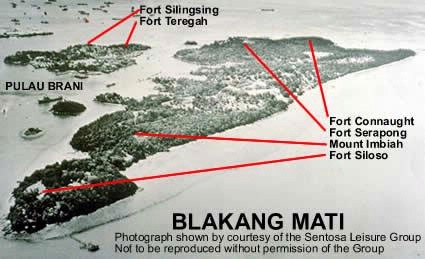 uation recalling my childhood into adolescent years. In fact from about 6 years old to nearly 22 years before we ever come back to live in the mainland of Singapore. It is beyond comprehension to imagine most of us living in Pulau Brani had to commute to school and to work in the mainland by sampans, ferries and whatever we could board. Most times we had to leave the island before Sunrise and come back after twilight . uation recalling my childhood into adolescent years. In fact from about 6 years old to nearly 22 years before we ever come back to live in the mainland of Singapore. It is beyond comprehension to imagine most of us living in Pulau Brani had to commute to school and to work in the mainland by sampans, ferries and whatever we could board. Most times we had to leave the island before Sunrise and come back after twilight .
It was just a 20 minutes sea-ride to Jardine Steps, located between the present Harbour front and the boarding Wharf the Star cruise ships today. Before cable cars and cataramans, Jardine Steps at that time was just a jetty with a simple concrete platform and docking bays with watery steps depending on the tide. Sea Cockroaches thrived in those stony places along with Oysters clusters growing throughout the supporting pillars. It looked exactly like the Buller Jetty in Pulau Brani. A roof was later added to protect passengers from the hot sun and thunders clapping rains. In 1959 a newer jetty was constructed. It serves as the harbour for trips to the various southern islands such as Pular Brani, Blakang Mati (Sentosa) and Pulau Bukom (Bukom Besar and Kechil leased to Shell for refining oil). Whilst we took Sampans for sea fare, the Shell employees enjoyed the luxury of larger ferries and comfortable seats. It was also around this time, the Laju ferryboat was introduced in the 60s which featured in the Laju Incident. The Chinese workers simply call Jardine Steps Harbout No 9 ( 9号码头).A group of skilled Cantonese workers commute from here to the factory by Bum boats (barges). They brought some sanity into my father's life, the foreman was a real friend with an arsenal of humourous jokes.
20 minutes might seem to be a short span of time but when you are in a tiny motorized sampan, with the lunging waves from the tug boats and huge cargo ships (ver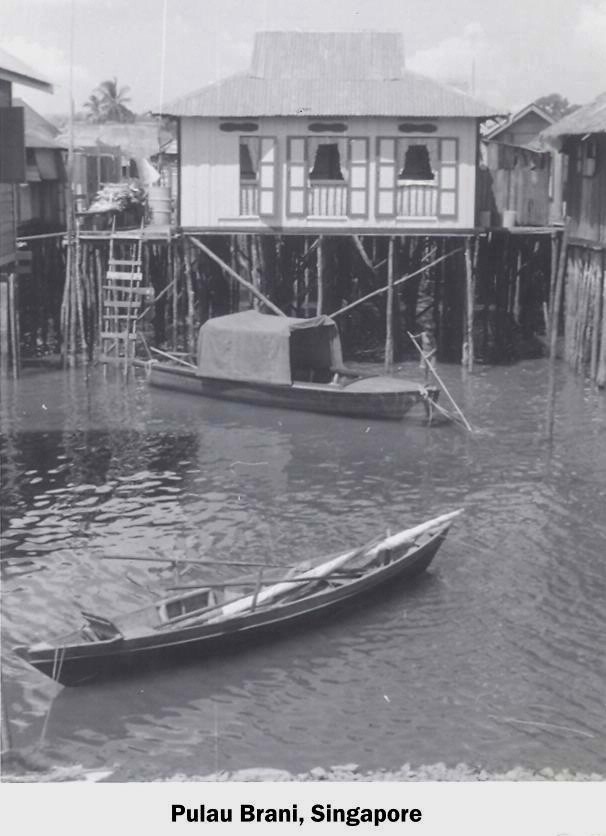 y funkiness little Tsunami domineering the waterways). We are looking at the busiest harbour this side of the Pacific and Indian oceans. The seasoned boatman learned to ride those waves with impunity everyday. Rarely do we hear of an overturned boat saved for an occasional episode. The roof of those sampans covered the mid-end section exposing the front to the weather (see picture on left). We young ones vyed to sit in front enjoying the thrill and rockiness and skimmered to avoid the splashing waves into the boat. It was a sea sawing thrill for us as the crafty boatman directed the vessel to meet the oncoming waves head-on. Up down, Up down riding the waves as the craft rocks, it was the only direction, frontally to avoid overturning the boat. y funkiness little Tsunami domineering the waterways). We are looking at the busiest harbour this side of the Pacific and Indian oceans. The seasoned boatman learned to ride those waves with impunity everyday. Rarely do we hear of an overturned boat saved for an occasional episode. The roof of those sampans covered the mid-end section exposing the front to the weather (see picture on left). We young ones vyed to sit in front enjoying the thrill and rockiness and skimmered to avoid the splashing waves into the boat. It was a sea sawing thrill for us as the crafty boatman directed the vessel to meet the oncoming waves head-on. Up down, Up down riding the waves as the craft rocks, it was the only direction, frontally to avoid overturning the boat.
We learned quickly to discern the signs in the sky whether it was going to rain within that half hour or so. Getting drenched those days for us boys were like taking a daily bath. Raincoats were the best form of protection as umbrellas would not work with the stronger winds unless we held on to the brolly top like a spreading tent over our heads.. The raincoats were light and could be folded snugly. Laughter and smiles were the norm. Childhood innocence at the prime and we were not aware that for the boatman, our safety was paramount as he manouvred the sampans through the waters. Most of us were good swimmers and divers so we worried only for our school bags. It did cross our minds though that this would be a perfect excuse not to finish our homework on time.
Those daily trips to and fro were actually quite fun though not fraught without dangers. There were larger and safer boats used by the British forces (picture below) but we were not employees so were not allowed on them until much later when Singapore moved toward independence (Merdeka!). Once in a while, the RP relented and did allow us to board and the journeys were totally uneventful. Well almost as long as the British RP were present. Years later, we had to board these ferries from anothe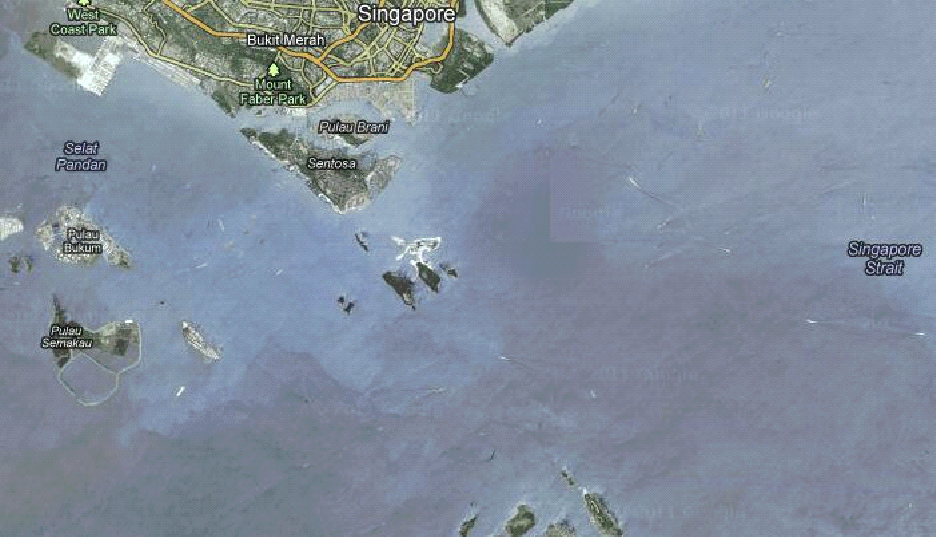 r jetty, in Selat Singkir fully controlled by the local Malays and then every journey was uneasy. Twice we ended in skirmishes with the local boys, one of them even borrowed and wore a thick ring to punch at my brother's eye. Don't get me wrong, there was racial tolerance and harmony. The adults did ensure that the situations were reigned-in before it escalated into boyish racial scuffles and fights. It could not be helped as we had to travel through the walkways smack into the dominantly local homes of that particular village. It was as though r jetty, in Selat Singkir fully controlled by the local Malays and then every journey was uneasy. Twice we ended in skirmishes with the local boys, one of them even borrowed and wore a thick ring to punch at my brother's eye. Don't get me wrong, there was racial tolerance and harmony. The adults did ensure that the situations were reigned-in before it escalated into boyish racial scuffles and fights. It could not be helped as we had to travel through the walkways smack into the dominantly local homes of that particular village. It was as though 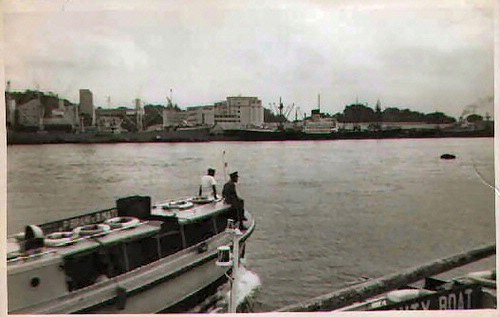 our very speech, perfunctory laughters and playfulness, our very presence were an affront to them. We eyed each other suspiciously. I for one seldom retreated when challenged to a fight because I had not learned to say “sorry” when it was not my fault. Today, I will readily say "sorry" to keep the peace even if it is not my fault. our very speech, perfunctory laughters and playfulness, our very presence were an affront to them. We eyed each other suspiciously. I for one seldom retreated when challenged to a fight because I had not learned to say “sorry” when it was not my fault. Today, I will readily say "sorry" to keep the peace even if it is not my fault.
Integration
As I looked back, I considered that most fighting were with our fists and never with weapons saved for that nasty “ring” that almost hit my brother's left eye directly. We wanted to retaliate when we reached Jardine Steps, but the jetty's Chinese uncles invariably would stop us. They did in that particular occasion. Surprisingly, after that incident, there were no further episodes and the animosity went away as we turned into our late teens, especially in the intermediate Malaysian years from 1963 to 1965. The National anthem changed to “Negara Ku” instead of "Majulah Singapura" and Malay language studies were added to our syllabus. We were okay with it as we picked up the colloquial speech easily. I remembered one of my "friends" packed me a painful wallop in the stomach when I was protecting a Malay boy from them. He could not understand why I was siding the boy who found himself surrounded by the few of us. I had been in such situations before and I know how that felt.
Now when our family arrived in the Island in 1956 or 1957, it was difficult to assimilate into the village commune as the Chinese were predominantly Hokkien (Fujian). Next were Teochews (ChouZhou), Hainanese and Hakkas (KeJia). Cantonese were a handful but my resourceful mother soon integrated us firmly as she was multilingual, and offered her help whenever possible. She obliged with gifts and offerings to the neighbours when we had our festivals unique to the Cantonese. Firstly, she made friends with the minority dialect groups, with like kindred spirit and later with the Hokkiens, our direct neightbours and larger majority. She would share chickens, pork dumplings, eggs and delicacies. Soon the alienation dissappeared. At that time both my legs were infested with sores (sand flies I think) and she invited a rich Tai Tai to diagnose me looking with bespectabled thick lens piercing owlish eyes. My mom used all means to generate acceptance into that community known as Masak Timah or Tin Smelting village.
For me it was difficult as I was involved with fights which were innocent when we lived in Victoria Street but not so in this island as it was a feudal-like community with one main rotund pipe-smoking Chinese contractor playing feudal lord because he provided the men with most of the jobs in Masak Timah. He could have 20 children from his three wives. One of his sons was our leader and we had night "catapult" hunts where under darkness we hunted for "white boys" to shoot at with stone pellets. One of the nights, we met a Malay group with the same wicked idea and one of them got a hit which resulted in some reckoning the next day as the whole Royal Army Corps were enraged. It was no fun at all. Soon the catapults were used for hunting lizards with missiles of green knobile cherry like fruit. I did not enjoyed that either and decided I rather go solo in this island. I looked for driftwoods. discarded wooden crates and wooden floatsum for fuel, gathering as many as I could from the shore. Chopping them into small pieces of firewood with a rusty axe. My mom left me alone for long hours as I made myself useful. It was also the year my youngest sister was born in that modest island home. There were no doctors but midwives. Yet they home-delivered the healthy baby and in April that year, my little sister, the fourth child was borned.
We, islanders and amateur fishermen, have certain protocols or understanding. It was taboo to flip any fish whilst dining because it could mean our boat would flip too. I was so surprised when I discovered that in Hong Kong, even amongst the boat people, they do flip their fishes when eating!! Since we are part Cantonese, we understood that the Hong Kongers simply chant : the next boat when they flip their fishes. Cantonese: Gak Lei Kor Chek! In English it means: the neighbours boat (not ours).
Yes, in the simple act of eating fish we learned how each culture developed into what they are today. Whilst we mastered the art of eating our fish sans flipping, we simply debone the fish skeleton top down before we "attack" the underside, the fine art in the use of chopsticks. We gained knowledge and skills in frying our fishes to the right tenderness, taste and texture whereas the Hong Kongers probably learned the finer art about killing their competitors, about self preservation and risks. They learned to trade goods at very young age. Never insult them by calling them Hongkies, they speak good if not even better English which I witnessed at the St. Andrew's Anglican Church in Nathan Road, one Sunday. The local preacher articulated impeccably with such spell binding passion and vigor.
Later from 1983, interfacing with Hong Kong Oxygen Ltd, I discovered the Hong Kongers were highly resilient and street smart, that even wiley Japanese businessmen were wary of them. Could this be because they do not have the same restrictions in dialects as we have? Having the same common language whereas ours were a melange of various races, (Europeans, Malays, Indonesians, Chinese and Indians)? That even amongst the Chinese (Cantonese, Hokkiens, Teochews, Hainanese, Shanghainese and HengHua) and Indians (Tamil, Sri Lankan Singhalese, Telegu, Malayalam, Hindustani, Punjabi and Pakistani (before Bangladesh and Pakistan)), there were many dialects. Or is it their Chinese heritage which we also have but ours were based more on five or more dialects whereas theirs were mainly Gaungdong Hua? Or was it because they were able to master the best of both worlds, the Chinese and the English thinking and reasoning? The two races most determinately affected by "face saving". Oh yes, I find the British more steeply into face saving than the Chinese aka, Falkland war and the many Footbrawls. "Stiff Upper lips" obnoxiousness I would say, such as some British VVIP's remark about "squinty eyes", "sleazy eyes" or East Indian Company tag of "yellow ticks" in exchange for "KwaiLo"? Don't we share the same weight-ages in conferring titles? Good morning Sir. Good morning Mr Hasting. Good afternoon Mrs Wong.
Imagine my surprise inside an airport toilet in Kansas City in 1980, a white gentleman blurted out, "Good morning, sir, how do you do?" (before how are you today?). Like it was so insane! Moe, my American friend from Madison, Wisconsin, proffered: "it is really very simple, Peter, if I addressed you as “Mister” I expect you to address me as “Mister” too". So that put paid to all the stuffs about “saving face” with the Americans. Sadly I had stayed and walked in that Aero Bridge at the Hyatt Hotel in Kansas City which fell killing nearly 2,000 people on one of the New Year Eves. Two years later, in a 3 star Paris Hotel, I was woken up by such a din below. It was only 5 am but the local Frenchmen were clearing the dustbins into a dumping truck, our hotel being above the busy wet and dry market as the hawkers started their day gesturing in friendly tones. White men clearing dustbins? There was an awakening, a catharsis, I realised there and then why everyone, skin colour notwithstanding, got to eke out their own sustenance.,
Enuff of digression, back to my story of how we moved to Pulau Brani. “Island of the braves” in the local dialect. My dad finally got a permanent job looking after a small DC powered electrical generator/station in the Island of Pular Brani, the quarter occupied by the Straits Trading Company, a Tin Mining and smelting enclave (Hsia Lonn in Hokkien) at that time. The Tin coming from Malaya and as far as Borneo. The island do have Tin deposits but the company do not have mining rights other than within their own bounds. The Electrical power was reserved for internal factory use as well as providing lighting to the company owned workers quarters (about 160 houses) daily from 6 pm to 6 am. It is not enough to power fans or other electrical devices for the households except for some unnoticed tapping. One socket to a room and that's all we got.
It was our second relocation and this time we have to go by lorry (truck) and transfer to a Ramp Powered LightCraft or RPL provided by the 37 Maritime Squadron RCT, British (Royal) Army Corps of Transport. The British base located there at that time was a craft support, repair workshop and warehouse for spare parts for their various LCT Naval crafts. I was too young to remember the event, but we must have embarked in Tanjong Berlayar and landed in a similar landing area in Pulau Brani (see picture of similar RPL landing). I remebered though, the long waiting time. (Royal) Army Corps of Transport. The British base located there at that time was a craft support, repair workshop and warehouse for spare parts for their various LCT Naval crafts. I was too young to remember the event, but we must have embarked in Tanjong Berlayar and landed in a similar landing area in Pulau Brani (see picture of similar RPL landing). I remebered though, the long waiting time.
The island is very tiny, 1.3 square Km about 1/4 the size of Blakang Mati. I rowed around it once in a canoe within 4 hours without any mishaps. You can see from the map above, the island is protected and sheltered more than the mainland itself. On some evenings, we enjoyed the various water sports provided by families of the British forces as they come out to play with their powered boats and water skis. Most days we just revelled in the sunlight, swimming during the high tides, diving for sea cucumbers, corals and star fish, and looking for sea shells, crabs and clamps when the tide receded. We used different lures when fishing. We caught sea worms (probably : Sipuncula or peanut worms) from the shore lines as the tide retreated and often times, I just grabbed me a bunch of sea cockroaches and hooked them as baits. To catch the sea worms, we sprinkled some rice water onto the loamy sand, wrapped our forefingers with bandages, and when the worms come out they normally try to nibble with their tiny evil looking claws at our fingers. We just snap them between the finger and the thumb. In this way, we could grab almost half a container (condensed milk cans) of worms, soaked them in sawdust, cut them into the right lengths into bits and pieces for our fish hooks. There were two kinds of such worms in the same habitat, one smooth skin and the other pocky kind, their tiny spines did hurt (probably : Annelida, or segmented worms) which cannot be used. The worms looked exactly like a cross between a millipede 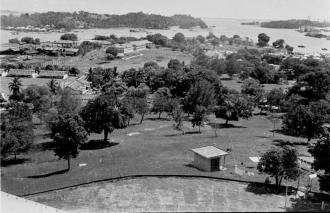 and centipede. The fishes must have loved them because we did good fishing with these baits. and centipede. The fishes must have loved them because we did good fishing with these baits.
As you can see from the first picture, the island could be identified by two mounts, Fort Silingsing and Fort Teregah. The former housed both the sergeants and officers messes each building with their own elaborate identity. If you've been to Sentosa, you get the idea of how they looked. There are the usual parties and free flow of NAAFI beer. The villages kind of ended with the leftover turkeys, ham and rare meats. We were fortunate later to get the best cuts as my hard working mother got a job serving a senior officer, who lived in the colonial bungalow, with its own servants quarters, doing their laundry and ironing, way inside the camp. This allowed me the freedom to go right into the camp to visit her when I bring her home cooked meals, cooked by my older sister or myself. I was stopped once during the 3 years my mom was working there, by a local Malay RP but I have as much right as he to enter the restricted zone. Regardless of the many Protected Area signboards, it was an island of my own. I swam freely in the nicest of golden beaches (fine granulated white sands reflecting the Sunlight) without hindrance saved for the occasion where the army was practicing live firing or so I was told.
Terrorists were unheard of those days (see Laju Incident in 1974) as it was less than 20 years after the 2nd World War and the Japanese were evicted when they surrendered. There were horror stories of massacre during the Japanese Occupation of the British and European citizens especially military staff, the medical doctors and nurses in the British Military Hospital now occupied by Alexandra Hospital. The kids explored the run down fort areas, the dark tunnels and the battery area not unlike those in the Labrador fort (see picture)in Batu Berlayer, now Labrador Park. We could see Keppel Harbour with large ships, tug boats and speed boats. On New Year Eve, exactly midnight, you can hear the ships blasting their horns as they still do today. 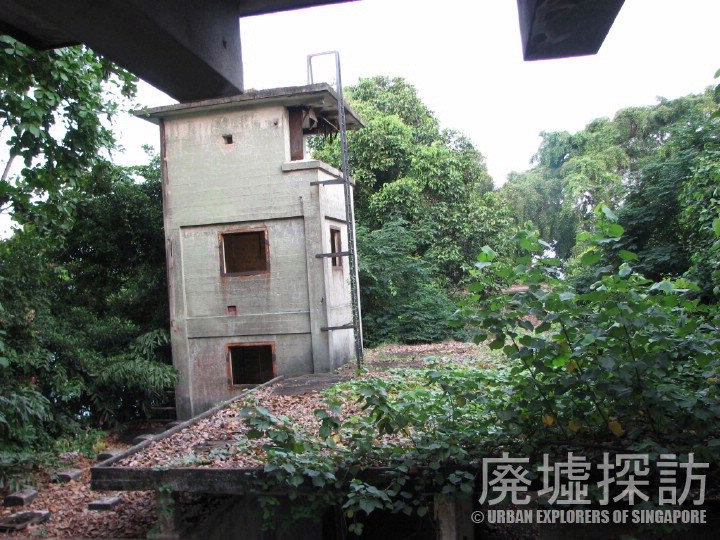
Like any forested area, we enjoyed the sound of crickets, croaking of frogs and various insects. We hunted 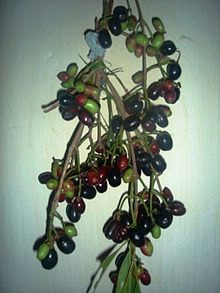 for wild berries. grape looking fruit, Jamul? (Buah Kuring?) and white faced spiders, the fiercest of tiny spiders that we caught for spider fighting not unlike the Roosters fighting you see in Indonesia and the Philiipines Place the antagonists on the surface of the matchbox, and you will be amused with the war dance, the strutting and the prancing before they meet each other head on until the loser retreat and scurry away. Almost the same thrill and childish joy you get when you put two colourful fighting fishes against each other. for wild berries. grape looking fruit, Jamul? (Buah Kuring?) and white faced spiders, the fiercest of tiny spiders that we caught for spider fighting not unlike the Roosters fighting you see in Indonesia and the Philiipines Place the antagonists on the surface of the matchbox, and you will be amused with the war dance, the strutting and the prancing before they meet each other head on until the loser retreat and scurry away. Almost the same thrill and childish joy you get when you put two colourful fighting fishes against each other.
Schooling
My mom registered me into the only Chinese primary school on the island, Da Chong Xiao Xue, about 20 to 23 students. I cried unabashedly when she left me there alone as did another boy, but soon we got into the rhythm of things as my seat in the classroom overlooked the stilt houses of Telok Saga, Between that and our school was a simple school fence and sloppy stony drop and I could hear the lapping of the waves. Telok Saga was an unusual village. Less than 50 homes all built on stilts riding the water below. Access to each house was via wooden bouncy planks placed across wooden breeches. Some of us tried to walk in them. Fear suddenly struck one of us and he wailed as loud as he could to get attention because right in the centre of that treacherous plank, you could not walk back or go forward. The only way was to stay as still as possible and hope nobody bounces that plank till help comes in the form of an adult steady hand. In the early years the walkways were only one plank in width and bouncy so when you walk, you got to walk with a bounce in rhythm to keep steady. The rescuer walked these planks expertly and sliding surely to rescue the helpless victim.
Most families were the local Malay folks, some descendants of the Orang Laut (Sea Gypsies, one of their famous son Othman Wok) but there were 3 or 4 Chinese families, a Chinese provision shop on the planks! One such family was where our famous Connie Francis/Millie Small winner (VY) of the 60's lived. I heard she is now living in Germany. Her brother married my sister's best friend. She was also our former neighbour. In Telok Saga, toilets and bathrooms were conveniently built as kitchen extensions and rubbish and waste were simply dumped into the sea below carried away when the tide comes in. You don't find cockroaches or rats in these places. Maybe sea snakes but they would not survive with the pungent waste. Ha ha. Sometimes the tide could be inviting and the children do jump into the water for fun. Distracted once, during one of my classes, I saw a young Chinese couple quarreling and the wife threw a porcelain bowl at the husband who caught it with his right hand, an impressive reflex.
For 2 straight years, I topped the Chinese classes until in the final exam, in Chinese spelling of the word “Fa” that I wanted to be sure I got it right and peeped into my exercise book. I was apprehended and my being first in class all those years became suspect after the Principle had a word with my mom. At that age, my urge to keep my number one status was so strong that I never thought that I would be considered a cheat, as I already got the spelling correct but it was just to confirm that I got it right.
What a disaster, story of my life? I probably deserved it? Was that why my mom later transferred me to my Sister's English school, Batu Berlayer Primary School in Pasir Panjang, 41/2 miles? That was a real ordeal having to get up early at 5:30 am for morning classes and taking that sampan trips. The local Mosque helped with the wake up call for prayers 5 o'clock everyday. My only consolation for this was that had I remained a Chinese student, I would have invariably be enlisted into the communist movement soon enough and become a revolutionist or probably retreated into the deep jungles of Malaya with the hard core rebels of Chin Peng, like one of my neighbour. Instead I ended up playing skipping rope with my sister's school mates and five stones? Fortunately for me, there were Chateks, spider fighting, stone throwing, soccer, baseball, table tennis and badminton. To this day, I never forget how to write “Fa”. Fatt in Cantonese and Huat in Hokkien (Fujian). So instead of becoming an ideological communist, I found God or rather God found me.
It was tough for me in the English schools. The teachers were not as dedicated and some of the Math's questions were real funny. For example, there were 10 birds resting on a branch, a hunter shot one. How many were left? In the Chinese classes, the correct answer must be 9 but in this class the correct answer is 0!! That was not a math's question, it was more an IQ comprehension because the teacher insisted that all the rest flew away after the first shot was fired! Anyway, I was wondering to myself, why do the hunter want to kill those poor birds? What have they done?
Though we were born as British subjects, it was only in December, 1982 that I visited England on our very own SIA staying at the Glooucester Hotel (bought by Millenium/Hong Leong Group) and meeting the worst snowstorm of the decades. ... next: Growing up in Pular Brani (after Future Home....)
|
Categories
The Incarnate God and His Own Blood makes the Perfect Sacrifice.
Posted: 04 February 2024
Israel in Egypt P:38 [53-0325]
38 There was a time that ...
The Rapture Scriptures : True Five-Fold Ministry Part III
Posted: 02 January 2024
First a very happy and blessed new Year as we come into 2024...
Joseph Branham Becomes A Subject Of A Sermon Instead Of Jesus Christ.
Posted: 16 November 2023
The True Five-Fold Ministry Part ll
And the same me...
The True Five-Fold Ministry
Posted: 10 September 2023
The True Five Fold Ministries....
We had many in the past...
|










